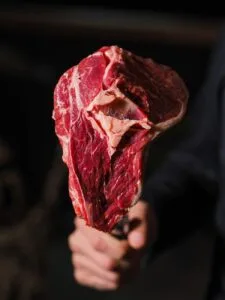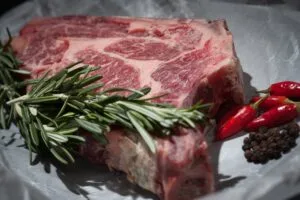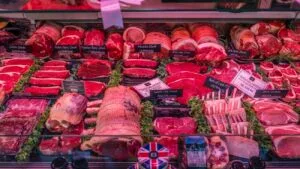
About Us
Jocyl's Food Products (a.k.a "Chorizo de Kalibo") is a bold and forward-thinking company whose goals are set to create surprising ways of developing and promoting our products. We are entrepreneurial and visionary in producing and marketing the best chorizo and other food products from our hometown - Kalibo, Aklan, Philippines.
About UsContact Info
- Tigayon Highway, Barangay Tigayon, Kalibo, Aklan
- +63362628688
- jocylsfoods@gmail.com
- Tigayon Highway, Barangay Tigayon, Kalibo, Aklan
- jocylsfoods@gmail.com
- +63362628688

The Health Benefits and Risks of Consuming Meat
-
Jocyl's Food Products > Blog > Food > The Health Benefits and Risks of Consuming Meat
As human beings, we have evolved to be omnivores, which means our bodies are designed to consume both plant-based and animal-based foods. For centuries, meat has been a staple food item in many people’s diets. However, in recent years, there has been a growing debate about the health benefits and risks of consuming meat. In this article, we will explore the health benefits and risks of consuming meat, as well as common FAQs related to this topic.
Health Benefits of Consuming Meat
Meat is an excellent source of protein, which is essential for building and repairing tissues in the body. Protein is also important for maintaining healthy bones, muscle mass, and the immune system. Beef, pork, and lamb are some of the best sources of protein in meat s.
Meat also contains essential nutrients like iron, zinc, and vitamin B12. Iron is important for red blood cell formation, while zinc is essential for the immune system and wound healing. Vitamin B12 is necessary for maintaining healthy nerve cells and producing DNA.
Meat is also a good source of healthy fats like omega-3 fatty acids. Omega-3 fatty acids are important for brain function, reducing inflammation, and improving heart health. Fish and seafood are some of the best sources of omega-3 fatty acids among all types of meat.
Health Risks of Consuming Meat(s)
While meat provides important nutrients, it also comes with some health risks. One of the most significant health risks of consuming meat is the increased risk of certain diseases. Studies have linked high consumption of meat, particularly red and processed meat, with an increased risk of heart disease, stroke, diabetes, and some types of cancer.
Red meat, especially when cooked at high temperatures, contains compounds that are carcinogenic (cancer-causing). Processed meat, including sausages, hot dogs, and bacon, often contains added preservatives like nitrates and nitrites, which have been linked to an increased risk of cancer.
Meat consumption can also have an environmental impact. The production of meat requires a significant amount of resources, including land, water, and animal feed. The animal agriculture industry is responsible for a large portion of greenhouse gas emissions, which contributes to climate change.
FAQs:
Q: Is it necessary to consume meat to get enough protein?
A: No, it is not necessary to consume meat to get enough protein. Plant-based sources of protein like beans, lentils, tofu, and tempeh are excellent sources of protein. Nuts and seeds, as well as some grains like quinoa, also contain protein.
Q: What is considered a high intake of red and processed meat?
A: According to the World Health Organization, consuming more than 50 grams (or about two slices) of processed meat per day or more than 100 grams (about the size of a deck of cards) of red meat per day is considered a high intake.
Q: Can I still consume meat in moderation?
A: Yes, you can still consume meat in moderation. Consuming small amounts of lean meat, such as chicken, turkey, and fish, can still provide the health benefits of meat without the increased risk of certain diseases associated with high intake of red and processed meat.
Social Media:
https://www.facebook.com/jocylsfoods
https://www.instagram.com/jocylsfoods
https://www.pinterest.ph/jocylsfoods
#Health #Benefits #Risks #Consuming #Meat
Recent Comments
Popular Feeds
Tags
- Aklan
- Aklan Pasalubong
- Boracay
- Boracay Food
- Boracay Island
- Boracay Pasalubong
- boracay snacks
- Boracay Souvenirs
- Breakfast
- Chicken
- chicken tocino
- Chori Burger
- chorizo
- ChorizoDeKalibo
- chorizo recipe
- Delicacies
- embutido
- embutido recipe
- Filipino Chorizo
- Filipino Cuisine
- filipino food
- Filipino Longganisa
- Filipino Sausage
- foodie guide
- homemade
- Iloilo
- Iloilo Food
- Iloilo Pasalubong
- iloilo souvenirs
- ingredients
- JocylsFoods
- longaniza
- longganisa
- longganisa recipe
- meat
- Pasalubong
- pinoy recipes
- pork tocino
- recipe
- Recipes
- skinless longganisa
- snacks
- tocino
- tocino recipe
- types of longganisa








